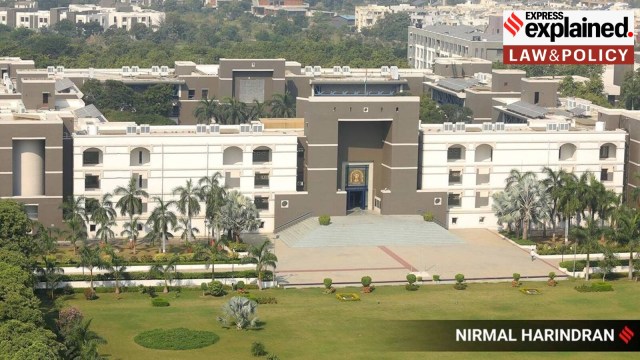What is Gujarat’s land grabbing law, and why has the HC dismissed the challenge to it?
The law applies retrospectively, reverses the burden of proof, and was passed without seeking Presidential assent. What did the petitioners argue, and what did the HC say?
 Gujarat High Court's two-judge Bench comprising Chief Justice Sunita Agarwal and Justice Anirudha P Mayee on May 9 dismissed a batch of petitions that challenged the law. (Express photo)
Gujarat High Court's two-judge Bench comprising Chief Justice Sunita Agarwal and Justice Anirudha P Mayee on May 9 dismissed a batch of petitions that challenged the law. (Express photo)The Gujarat High Court has upheld the constitutional validity of the Gujarat Land Grabbing (Prohibition) Act, underlining legislative supremacy over judicial review.
The law, brought into effect from December 2020, retrospectively criminalises “land grabbing” of both public and private property, reverses the burden of proof, and prescribes a minimum sentence of 10 years for violations.
A two-judge Bench comprising Chief Justice Sunita Agarwal and Justice Anirudha P Mayee on May 9 dismissed a batch of petitions that challenged the law.
What are the important features of this law?
The law “to prohibit land grabbing activities and connected matters in the State of Gujarat” is aimed at ensuring “time-bound and speedy disposal of complaints and protect the interests of farmers and common man”, then Chief Minister Vijay Rupani had said while introducing the Bill in the Assembly.
According to the state government, the law was brought to not only declare land grabbing as unlawful but to also prohibit the offence, following reports that the land of several farmers had been grabbed by the land mafia.
The law essentially replaced proceedings under existing legislation such as the Transfer of Property Act, Public Premises (Eviction of Unauthorised Occupants) Act, 1971, and brought the offence of land grabbing under a single special legislation.
Crucially, the law is applicable retrospectively — which means it can change what was legal or illegal before the law came into force — and contemplates both civil and criminal action. Apart from eviction, it prescribes a minimum punishment of 10 years in jail, which can go up to 14 years, and also a fine equal to the jantri (revenue value, as opposed to market value) value of the property in question.
Section 11 of the law imposes a reverse burden of proof, which means that on a prima facie allegation, the special court shall presume that “the person who is alleged to have grabbed the land is a land-grabber and the burden of proving that the land has not been grabbed by him shall be on such person”.
This shifting of the onus on the accused to prove that he has a valid, lawful entitlement to the property is a departure from the settled law which states that even a squatter can be dislodged only in accordance with the principles of due process.
On what grounds was the law challenged in court?
The challenge was based on two key grounds: on a procedural violation of the constitutional requirement to seek assent of the President, and on the substantive ground that the law is vague and manifestly arbitrary.
PRESIDENTIAL ASSENT: On the procedural aspect, the petitioner argued that since the state legislation is repugnant to several central laws, it requires the assent of the President.
Section 15 of the Act allows for an “overriding effect” on all other laws: “The provisions of this Act shall have effect notwithstanding anything inconsistent therewith contained in any other law for the time being in force or custom, usage or agreement or decree or order of a court or any other tribunal or authority.”
Senior advocate Asim Pandya argued that a special law that is repugnant to the general law applicable to the field would require Presidential assent to be valid.
Article 254 of the Constitution prescribes the procedure to deal with inconsistency between laws made by Parliament and by a state legislature. When a state makes a law that is repugnant to a subject in the Concurrent List, it can be applicable only “if it has been reserved for the consideration of the President and has received his assent…”
Such assent has to be received in advance, and not after the law has been made applicable.
For example, the Uttarakhand law on the Uniform Civil Code received presidential assent, as Entry 5 of the Concurrent List deals with marriage and divorce, succession, and connected aspects.
In the present case in Gujarat, criminal law and transfer of property fall under Entry 1 and 6 respectively in the Concurrent List.
However, the HC applied the “doctrine of pith and substance”, which is an examination of the essence of the law as a whole — and determined that the Gujarat land grabbing law actually deals with Entry 18 of the State List that deals with land.
The State List entry on land includes rights in or over land, land tenures including the relation of landlord and tenant, and the collection of rents; transfer and alienation of agricultural land; land improvement and agricultural loans; and colonisation.
MANIFEST ARBITRARINESS: A lack of intelligible differentia and “a reasonable and logical basis for classifying individuals into distinct groups for the purpose of legislation” are grounds for striking down a legislation on the basis of manifest arbitrariness.
The petitioners argued that clubbing private complaints on encroachments and grabbing of public land cannot be treated alike since such private complaints could originate from succession and partition suits, etc.
Crucial to the application of the law is the broad definition of land grabbing itself. The law defines it to include the act of occupying (or attempt) with or without the use of force, over any land (government or private) “over which he or they have no ownership, title or physical possession, without any lawful entitlement….”
The term “lawful entitlement” is not defined. This raises questions on whether adverse possession would be considered lawful entitlement.
Under the Limitation Act, a known squatter after 12 years will be entitled to ownership of the land in case of private property and after 30 years in case of public land. Adverse possession, a settled area of law, also ensures there cannot be retrospective application of law. The Gujarat law is silent on this aspect.
The HC, however, held that the law cannot be said to be retrospective in nature since the offence of land grabbing is a “continuous one” if he continues to be in possession.
“The enactment works as a deterrence, simply sending a message that all those who have occupied someone else’s land, whether owner is Government, a public body or a private person, shall have to hand over the possession or vacate the “grabbed land” to restore possession to the rightful person or else they will be considered as a “land grabber” and criminal proceedings shall be initiated against them,” the court held.
On the reversal of burden of proof, the court held that while the “the accused or the person against whom allegations of land grabbing has been made, cannot remain silent in such circumstances as onus to speak to prove his lawful entitlement to the land in question shifted on him.”



- 01
- 02
- 03
- 04
- 05



































